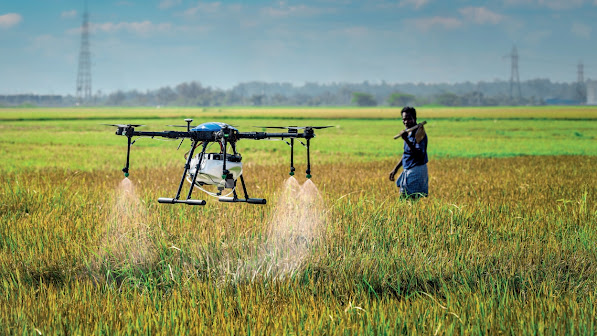''' ASIANS FARMING
ASSETS ''' :
TECHNOLOGY
' IN THE GREEN ' AND GO HAVE YOUR WEETABIX : SO ! FIRST AND FOREMOST ! :
The World Students Society - the most democratic organisation in the world - is the exclusive and eternal ownership of every student of India, just as it is similarly owned by every student in the world.
INDIA'S STERLING EVOLUTION FROM AGRICULTURAL BASKET CASE TO BREADBASKET : But just some years ago, - and in some parts even now, Indian agricultural has a very repetition, which the world knows, is not unfair.
About half the country's workforce toils on the land. Their labour unfolds in the brutal heat and tends to be done by hand or in unsherleterd, rudimentary vehicles. Seasonal financing often comes through informal channels, with lending at annual rates approaching 30%.
Paralysing debts are not uncommon. Production efficiency is low; yields for corn, rice, wheat and other crops are a fraction of those in America, China and Europe.
In Punjab, the country's heartland, roadside signs forgo typical advertisements for cars, films and phones, and instead hawk foreign-language training, overseas education and expedited visas. What local farmers want is not a new gadget but a way out.
Yet in some senses, rather than stagnating. Indian agriculture is flourishing. Working conditions may be grim, but record harvest follows record harvest - and famine is the thing of the past. Farming exports in the fiscal year ending last March were up by 9% on the previous 12 months, hitting $12 billion and representing 7% of India's outbound trade.
During the global food scare that followed Russia's invasion of Ukraine last year, India became a pivotal exporter of rice and wheat [ It is the world's second biggest producer of both ], as well as other grains.
In one of many such examples, it recently agreed to send 20 million tonnes of wheat to the Taliban in Afghanistan adding to 40 million tonnes last year.
India would be more important still to global agriculture were it not for the periodic export restraints and tax surcharges that the government imposes. Such restrictions are not the only official obstacles.
Subsidies for fertilisers and pesticides have depleted soil fertility. Some countries occasionally ban imports from India out of concern about chemical residue. Minimum price supports have led to an emphasis on thirsty crops, such as rice, in regions where water is scarce, depleting aquifers.
Restrictions on sales means farms are often divided among children into smaller, less efficient plots. The average holding has shrunk from 5 acres in the late 1970s to 2.5 today.
To maximise output on such tiny plots, wheat farmers throughout northern India burn the post-harvest stubble in order to shrink the time between reaping and sowing, producing a thick toxic cloud over much of the land.
HOWEVER, Indian agriculture has begun a subtle revolution - in terms of policies, technology and finance. - that is helping bypass the many official constraints. This is apparent in the economic data.
A little more than a decade ago, agriculture and manufacturing produced similar amounts of gross value added, a measure that subtracts purchase costs from revenues to capture contributions to economic activity. The most recent numbers show that agriculture contributes a quarter more.
HDFC Bank, India's most important private financial institution, has increased agriculture lending from $1.2 billion in 2015 to $7.5 billion last year, charging somewhere in the region of a third half the rates that are typically found in the informal market.
MEANWHILE, technology and market forces are seeping into the broader production forces. McKinsey, a consultancy, reckons that there are at least 1,000 Indian ''agtech'' companies, which have raised some $1.6 billion.
Through cheap smartphone apps, satellite data can now provide guidance on soil treatment, sowing and harvest dates, as well as when and how to employ fertilsers and pesticides. These changes attract plenty of attention and excite investors, blurring practical limitations.
Visit a farm whose inexpensive mobile phone has a cracked screen, limited memory and spotty connections, and it is evident that transformation will have to unfold gently.
The Honour and Serving of the Latest Global Operational Research on Making Hay while the Sun shines, continues. The World Students Society thanks The Economist.
With most respectful dedication to the Students and Farmers of India, and then Students, Professors and Teachers of the world. See You all prepare for Great Global Elections on !WOW! - for every subject in the world : wssciw.blogspot.com and Twitter X !E-WOW! - The Ecosystem 2011 :
Good Night and God Bless
SAM Daily Times - the Voice of the Voiceless

.png)


0 comments:
Post a Comment
Grace A Comment!